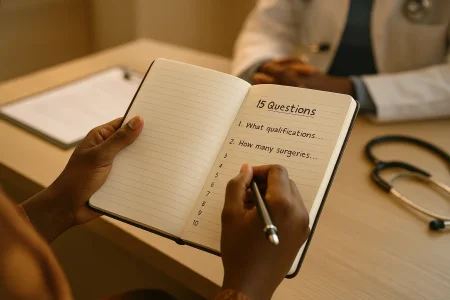
When the Diagnosis Comes, Time Doesn't Stop
The ultrasound confirmed what you suspected: fibroids. Now, your doctor is talking about surgery dates, hospital deposits, and recovery times. Your mind races while you nod politely. You want to ask questions, but the consultation room feels clinical and rushed. The doctor seems busy. You don't want to appear difficult.
Stop right there.
This is your body. Your fertility. Your future. The specialist you choose and the questions you ask now shape everything that follows—from whether you keep your uterus to how much you pay, from recovery time to surgical complications.
Yet studies show Nigerian women often delay seeking care for an average of 3.6 years, and when they finally consult specialists, many book surgery without asking the essential questions that could change their outcomes entirely.
Here are the 15 questions that separate rushed decisions from informed choices.
About Your Specialist's Training
1. What qualifications and fellowships do you hold?
In Nigeria, competent gynaecologists treating complex fibroid cases typically hold FWACS (Fellowship of the West African College of Surgeons), FMCOG (Fellowship of the National Postgraduate Medical College of Nigeria), or MRCOG (Member of the Royal College of Obstetricians and Gynaecologists)—the international gold standard.
What you're listening for: Specific fellowship credentials, not just "I'm a qualified gynaecologist." These fellowships require years of residency training and rigorous examinations at teaching hospitals.
Red flag: Defensiveness when asked about qualifications, or vague responses like "I have all necessary certifications."
2. How many fibroid surgeries do you perform each month?
Experience matters profoundly. Specialised fibroid centres in Nigeria perform hundreds of surgeries annually, giving their teams deep expertise with various fibroid sizes, locations, and potential complications.
What you're listening for: Specific numbers. "We handle 15-20 fibroid cases monthly" tells you more than "I've done many."
Red flag: Vague answers like "enough" or "I've seen it all" without concrete numbers.
3. Have you treated cases similar to mine before?
Your fibroids have specific characteristics: size, location (intramural, submucosal, subserosal), and number. A specialist experienced with your particular type offers better outcomes.
What you're listening for: "Yes, I've handled multiple cases with large intramural fibroids like yours" demonstrates relevant experience.
Red flag: "All fibroids are basically the same" - they're not.
About Treatment Options
4. What are ALL my treatment options, not just the one you recommend?
Nigeria now offers multiple approaches: myomectomy (removing fibroids whilst keeping the uterus), hysterectomy (removing the uterus), uterine fibroid embolisation (UFE), laparoscopic surgery, and even non-invasive HIFU technology.
What you're listening for: A specialist who explains at least three options with pros and cons for each, specific to your case.
Red flag: Immediately pushing hysterectomy as the "only option" without discussing alternatives, especially if you're under 40 or haven't completed your family.
5. Why do you recommend this particular treatment for me specifically?
The reasoning matters. Is it based on your fibroid characteristics, age, fertility goals, and medical history? Or is it simply what this doctor typically does?
What you're listening for: Specific clinical reasons tied to your case: "Given your fibroid location and desire for children, myomectomy offers the best balance."
Red flags: "This is what I usually do" or "It's the easiest approach"—your treatment should be personalised, not routine.
6. If I want to preserve my fertility, what's possible?
This question is non-negotiable if you haven't completed your family or might want children someday. Hysterectomy ends that possibility permanently.
What you're listening for: Discussion of fertility-sparing options like myomectomy, and honest assessment of your chances for pregnancy afterwards.
Red flag: Dismissing your fertility concerns with "You already have children" or "You're getting older anyway."
7. What happens if I wait rather than have surgery now?
Not all fibroids require immediate surgery. Some women manage symptoms effectively for years with monitoring and medication.
What you're listening for is an honest assessment of the risks versus benefits of waiting and symptoms that would signal an urgent need for surgery.
Red flag: Creating artificial urgency ("You must do this now") without medical justification, or refusing to discuss watchful waiting.
About Risks and Recovery
8. What are the possible complications of this surgery?
Every surgery carries risks. Even specialised centres report complication rates—what matters is that your doctor discusses them honestly.
What you're listening for: Specific risks for your procedure: bleeding, infection, injury to surrounding organs, conversion to hysterectomy if bleeding can't be controlled during myomectomy.
Red flag: "Don't worry, nothing will go wrong" or minimising risks—honesty protects you better than false reassurance.
9. What is your complication rate for this type of surgery?
Experienced specialists track their outcomes. This isn't about blaming doctors for complications but understanding their track record.
What you're listening for: Willingness to discuss outcomes honestly, ideally with statistics: "Our infection rate is under 5%, which aligns with international standards."
Red flag: Refusing to discuss complication rates or claiming zero complications ever.
10. What will my recovery look like, realistically?
Recovery impacts your work, family responsibilities, and finances. Different procedures have vastly different recovery times - laparoscopic surgery might be 2-3 weeks, whilst open myomectomy could be 6-8 weeks.
What you're listening for: Specific timeline, pain management plan, activity restrictions, when you can return to work, sexual activity restrictions, and follow-up schedule.
Red flag: Vague assurances like "You'll be fine soon" without specific timeframes or recovery protocols.
About Costs and Logistics
11. What is the total cost breakdown for this treatment?
Fibroid treatment in Nigeria ranges from ₦700,000 to ₦3 million, depending on procedure and location. You deserve to know exactly what you're paying for.
What you're listening for: Itemised costs: surgeon's fee, hospital charges, anaesthesia, medications, blood tests, post-operative care. "Surgery costs ₦800,000, hospital stay is ₦200,000, anaesthesia ₦150,000" is transparent.
Red flag: "We'll discuss costs after" or significant unexpected charges appearing on the final bill.
12. Do you offer payment plans or work with foundations that subsidise costs?
Some Nigerian hospitals and foundations assist women who cannot afford full treatment costs upfront. Not asking means missing potential help.
What you're listening for: Information about payment instalments, foundation partnerships, or reduced-cost surgical days.
Red flag: Immediately dismissing cost concerns without exploring options: "You either have the money or you don't."
13. What if complications arise during surgery—what are the additional costs?
Extended surgery time, blood transfusions, ICU admission—complications happen. Understanding potential costs protects you from financial shock.
What you're listening for: Honest discussion of potential additional costs and what scenarios might trigger them.
Red flag: "Don't worry about that now"—worrying about it now is precisely when it helps.
About Facility and Follow-Up
14. What technology and facilities are available at your hospital?
Modern equipment enables better outcomes. Leading centres offer laparoscopic equipment, advanced imaging, blood banking, and ICU facilities.
What you're listening for: Specific equipment mentions: "We have HD laparoscopic towers, ultrasound-guided surgery capabilities, and 24-hour blood bank access."
Red flag: "We have everything we need" without specifics, or outdated facilities you observe during your visit.
15. How will you support me after surgery if complications arise?
Post-operative care determines recovery success. Knowing who to call at 2 AM when you're bleeding excessively or running a fever matters immensely.
What you're listening for: a clear 24-hour emergency contact system, scheduled follow-up appointments, protocol for handling complications, and readmission policies.
Red flag: "Come back if there's a problem" without specific guidance on what constitutes an emergency or how to reach them.
The Questions Within the Questions
These 15 questions do more than gather information. They reveal character.Does your specialist answer patiently or impatiently? Do they explain using words you understand or hide behind medical jargon? Do they respect your need to know or dismiss it as inconvenient?
The specialist who welcomes your questions demonstrates respect for your autonomy. The one who rushes or dismisses them reveals how they'll treat you when complications arise or recovery doesn't go as planned.
Your Rights as a Patient
Before we finish, remember these fundamental truths:You have the right to:
- Ask any question without apology
- Seek a second opinion before major surgery
- Understand all treatment options available
- Refuse recommended treatment
- Request time to think before deciding
- Have your medical records and results explained clearly
- Change doctors if you're uncomfortable
- Being difficult by asking questions
- Wasting the doctor's time by seeking clarification
- Obligated to accept the first recommendation
- Required to make immediate decisions about surgery
When Second Opinions Become Essential
If your specialist recommends a hysterectomy and you're under 40, get a second opinion. If costs seem unreasonably high compared to your research, consult elsewhere. If you feel rushed, pressured, or dismissed, trust that discomfort.Many Nigerian women discover fertility-sparing options they weren't initially offered only after consulting a second specialist who uses different surgical techniques or has access to newer technology.
Second opinions aren't disloyalty. They're wisdom.
The Conversation You Deserve
The right fibroid specialist doesn't just tolerate your questions - they welcome them. They explain patiently, respect your concerns, discuss options honestly, and support your decisions even when those decisions differ from their recommendations.You're not just choosing surgical skill. You're choosing a partner for a journey involving multiple appointments, surgery, recovery, and follow-up care. That partnership requires trust, and trust requires honest answers to honest questions.
These 15 questions give you the foundation. Your instincts provide the rest. If something feels wrong—if you feel unheard, rushed, or dismissed—that feeling deserves attention.
Your body, your fertility, your choice. The specialist who honours all three earns the right to operate.
Don't book surgery until these questions have answers. And don't apologise for asking them.
Sources
- PMC Population Study (2018): Patient Experience with Fibroids - 3.6-year treatment delay, diagnosis patterns
- RCOG (Royal College): MRCOG Qualification Standards - International certification gold standard
- IGCS Training Site: Nigeria Gynecologic Fellowship - FWACS training standards and requirements
- Abiodun Falade Hospital: Nigerian Fibroid Surgery Centre - 600+ surgeries, foundation support options
- IRDOC Nigeria: Minimally Invasive Fibroid Treatment - UFE and treatment options in Nigeria
- Nairametrics (2025): Fibroid Treatment Costs - ₦700k-₦3m cost analysis
- National Hospital Abuja: OB/GYN Department Standards - Tertiary care facilities
- South Shore Women's Hospital: Surgical Services - Recovery protocols and outcomes
- PMC Clinical Study (2012): Nigerian Hospital 5-year Review - Complication rates and outcomes




